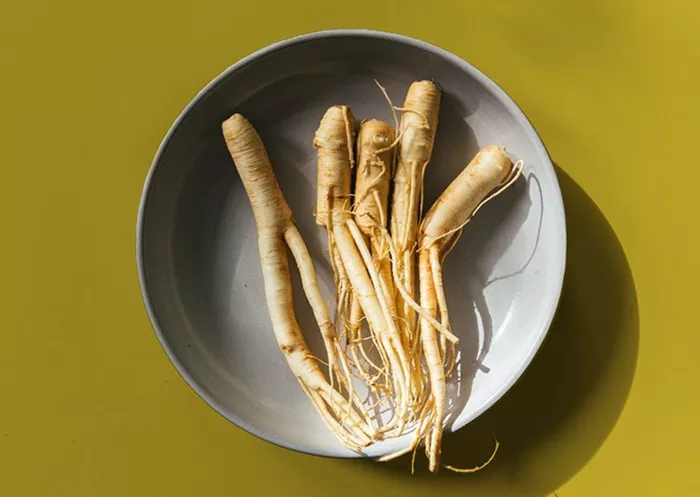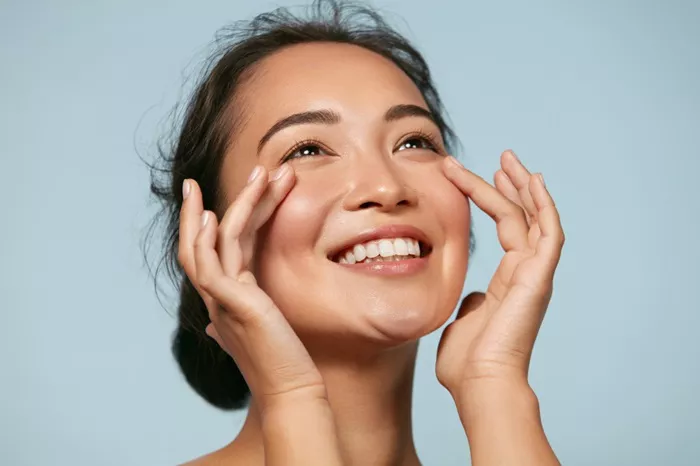Korean ginseng, revered for its skin-healing properties, is gaining attention for its ability to diminish dark spots, firm skin, and soothe redness.
During a recent visit to a ginseng farm in Yeoju-Si, South Korea, I was initially unimpressed by the plants. With tall stems and medium-sized oblong leaves, they seemed ordinary at first. However, when a farmer unearthed a root, its unique, twisted shape—reminiscent of human limbs—captivated our group.
The ginseng plant thrives in the shaded, mountainous areas of South Korea, where the environment is more conducive to its growth. On open fields, ginseng is often covered with tarps to protect it from the sun. This tuber has been utilized for centuries by Koreans for various ailments, from fatigue to dull skin. The crop is so highly regarded that it is regulated under strict standards set by the Ministry of Food & Drug Safety, South Korea’s equivalent of the U.S. Food & Drug Administration.
During my visit, I was hosted by KT&G and its subsidiary, the Korea Ginseng Corporation, known for its premium Korean red ginseng products marketed under the brands CheongKwanJang and Jung Kwan Jang. As a beauty editor, my focus was on ginseng’s applications in skincare, especially after noticing its prevalence in many K-beauty products in Seoul’s bustling Myeong-dong shopping district.
The Science Behind Ginseng’s Skin Benefits
Korean American dermatologist Dr. Yunyoung Claire Chang explains that topical ginseng is rich in antioxidants, which can help diminish signs of premature aging and protect the skin. “It also exhibits anti-inflammatory and brightening properties,” she adds.
While many skincare ingredients claim similar benefits, ginseng stands out due to its generally high tolerance among users. Ingredients like retinol can provoke skin sensitivity, but ginseng does not typically carry such risks. However, Dr. Chang advises conducting a patch test before introducing any new skincare product.
The ginseng farm I visited was preparing for the autumn harvest, the optimal time for collecting the plant after it has matured for about six years. Following harvest, the land must remain fallow for two years before planting anew. Under stringent Ministry of Food & Drug Safety regulations, only the root is approved for consumption. KT&G collaborates with independent farmers to manage this extensive eight-year process, ensuring high-quality production that many believe distinguishes Korean ginseng from varieties cultivated in China.
The key to ginseng’s efficacy lies in its bioactive compounds, known as ginsenosides. These components offer several health benefits, including immune support, improved circulation, and reduced fatigue. More than forty ginsenosides have been identified in Korean ginseng extracts, with Panax ginseng—considered the highest quality of the species—receiving special recognition.
Ginsenosides also contribute to ginseng’s skin-enhancing effects. According to Dr. Chang, these antioxidants help repair oxidative damage and maintain skin firmness by inhibiting matrix metalloproteinases (MMPs), enzymes that break down collagen. Furthermore, research indicates that ginseng extracts can inhibit melanogenesis, presenting a potential treatment for hyperpigmentation, particularly beneficial for those with sensitive skin.
Incorporating Ginseng into Your Skincare Routine
Ginseng’s compatibility with other ingredients makes it an appealing addition to any skincare routine. After returning from Seoul, I incorporated various ginseng-infused products into my regimen without experiencing adverse reactions. Experts suggest that ginseng enhances the efficacy of established skincare staples, making it a soothing complement to existing products.
Phoenix-based dermatologist Dr. Karan Lal describes ginseng as “very soothing and calming,” suggesting it can enhance the effects of other active ingredients or serve as a milder alternative.
Currently, I apply my preferred ginseng product, Beauty of Joseon Ginseng Essence Water, each morning before my vitamin C serum and sunscreen. While it can also be used in the evening, its antioxidant properties make it particularly effective against daily environmental aggressors. When selecting products, look for panax ginseng, which may offer enhanced skin benefits due to its diverse array of ginsenosides, although further research is needed to substantiate these claims.
Featured Ginseng Products
Then I Met You Renewing Rich Beauty Cream Panax Ginseng Concentrate – $60 at Sephora
Beauty of Joseon Revive Serum Ginseng + Snail Mucin – $15 at Amazon
Naturopathica Beech Tree Ginseng Daily Moisturizer – $73 at Dermstore
Origins Ginzing Refreshing Eye Cream – $37 at Ulta Beauty
While I have yet to witness a dramatic transformation in my skin from incorporating ginseng, I remain committed to its use. A comprehensive skincare regimen is built on a synergy of various products, not just a single ingredient. I regard ginseng as a valuable asset in my skincare arsenal—offering numerous potential benefits with minimal drawbacks.
Related Topics
Essential Hair and Skincare Tips for Winter Preparation
Understanding Skincare Ingredients for a Radiant Glow This Festive Season


































